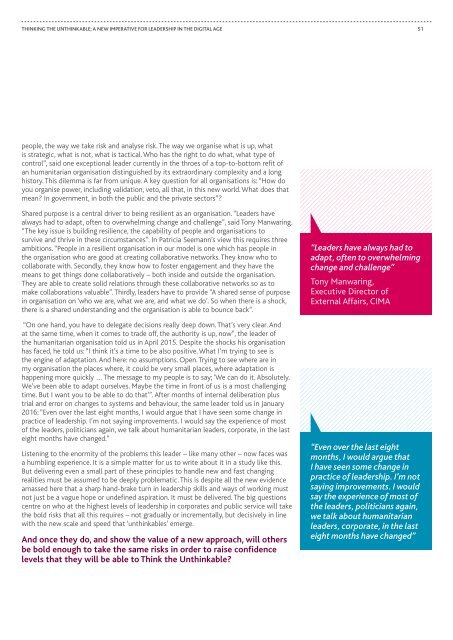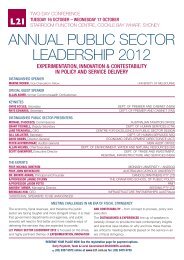Thinking the Unthinkable
Thinking-the-Unthinkable-cima-report
Thinking-the-Unthinkable-cima-report
You also want an ePaper? Increase the reach of your titles
YUMPU automatically turns print PDFs into web optimized ePapers that Google loves.
THINKING THE UNTHINKABLE; A NEW IMPERATIVE FOR LEADERSHIP IN THE DIGITAL AGE<br />
51<br />
people, <strong>the</strong> way we take risk and analyse risk. The way we organise what is up, what<br />
is strategic, what is not, what is tactical. Who has <strong>the</strong> right to do what, what type of<br />
control”, said one exceptional leader currently in <strong>the</strong> throes of a top-to-bottom refit of<br />
an humanitarian organisation distinguished by its extraordinary complexity and a long<br />
history. This dilemma is far from unique. A key question for all organisations is: “How do<br />
you organise power, including validation, veto, all that, in this new world. What does that<br />
mean? In government, in both <strong>the</strong> public and <strong>the</strong> private sectors”?<br />
Shared purpose is a central driver to being resilient as an organisation. “Leaders have<br />
always had to adapt, often to overwhelming change and challenge”, said Tony Manwaring.<br />
“The key issue is building resilience, <strong>the</strong> capability of people and organisations to<br />
survive and thrive in <strong>the</strong>se circumstances”. In Patricia Seemann’s view this requires three<br />
ambitions. “People in a resilient organisation in our model is one which has people in<br />
<strong>the</strong> organisation who are good at creating collaborative networks. They know who to<br />
collaborate with. Secondly, <strong>the</strong>y know how to foster engagement and <strong>the</strong>y have <strong>the</strong><br />
means to get things done collaboratively – both inside and outside <strong>the</strong> organisation.<br />
They are able to create solid relations through <strong>the</strong>se collaborative networks so as to<br />
make collaborations valuable”. Thirdly, leaders have to provide “A shared sense of purpose<br />
in organisation on ‘who we are, what we are, and what we do’. So when <strong>the</strong>re is a shock,<br />
<strong>the</strong>re is a shared understanding and <strong>the</strong> organisation is able to bounce back”.<br />
“On one hand, you have to delegate decisions really deep down. That’s very clear. And<br />
at <strong>the</strong> same time, when it comes to trade off, <strong>the</strong> authority is up, now”, <strong>the</strong> leader of<br />
<strong>the</strong> humanitarian organisation told us in April 2015. Despite <strong>the</strong> shocks his organisation<br />
has faced, he told us: “I think it’s a time to be also positive. What I’m trying to see is<br />
<strong>the</strong> engine of adaptation. And here: no assumptions. Open. Trying to see where are in<br />
my organisation <strong>the</strong> places where, it could be very small places, where adaptation is<br />
happening more quickly … The message to my people is to say; ‘We can do it. Absolutely.<br />
We’ve been able to adapt ourselves. Maybe <strong>the</strong> time in front of us is a most challenging<br />
time. But I want you to be able to do that’”. After months of internal deliberation plus<br />
trial and error on changes to systems and behaviour, <strong>the</strong> same leader told us in January<br />
2016: “Even over <strong>the</strong> last eight months, I would argue that I have seen some change in<br />
practice of leadership. I’m not saying improvements. I would say <strong>the</strong> experience of most<br />
of <strong>the</strong> leaders, politicians again, we talk about humanitarian leaders, corporate, in <strong>the</strong> last<br />
eight months have changed.”<br />
Listening to <strong>the</strong> enormity of <strong>the</strong> problems this leader – like many o<strong>the</strong>r – now faces was<br />
a humbling experience. It is a simple matter for us to write about it in a study like this.<br />
But delivering even a small part of <strong>the</strong>se principles to handle new and fast changing<br />
realities must be assumed to be deeply problematic. This is despite all <strong>the</strong> new evidence<br />
amassed here that a sharp hand-brake turn in leadership skills and ways of working must<br />
not just be a vague hope or undefined aspiration. It must be delivered. The big questions<br />
centre on who at <strong>the</strong> highest levels of leadership in corporates and public service will take<br />
<strong>the</strong> bold risks that all this requires – not gradually or incrementally, but decisively in line<br />
with <strong>the</strong> new scale and speed that ‘unthinkables’ emerge.<br />
And once <strong>the</strong>y do, and show <strong>the</strong> value of a new approach, will o<strong>the</strong>rs<br />
be bold enough to take <strong>the</strong> same risks in order to raise confidence<br />
levels that <strong>the</strong>y will be able to Think <strong>the</strong> <strong>Unthinkable</strong>?<br />
“Leaders have always had to<br />
adapt, often to overwhelming<br />
change and challenge”<br />
Tony Manwaring,<br />
Executive Director of<br />
External Affairs, CIMA<br />
“Even over <strong>the</strong> last eight<br />
months, I would argue that<br />
I have seen some change in<br />
practice of leadership. I’m not<br />
saying improvements. I would<br />
say <strong>the</strong> experience of most of<br />
<strong>the</strong> leaders, politicians again,<br />
we talk about humanitarian<br />
leaders, corporate, in <strong>the</strong> last<br />
eight months have changed”



